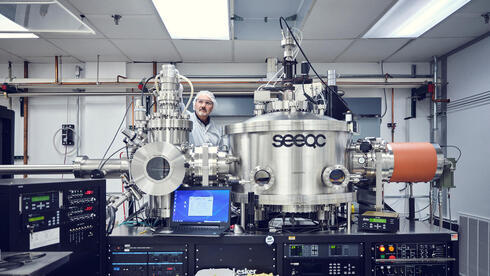
Quantum computing sparks real estate race
JLL report forecasts global demand for specialized data centers, with Tel Aviv emerging on the map of quantum hubs.
When thinking about quantum computing, real estate is probably the last thing that comes to mind. But in a new report from JLL, the connection between them is presented as clear and direct. Under the title "The Future of Quantum Real Estate," the American real estate giant analyzes how a technology that originated in physics laboratories is gradually becoming a commercial asset with enormous impact, why data centers will become the arena of significant change, and which cities around the world are beginning to establish themselves as global ecosystems in the field.
To understand the magnitude of the change quantum computing may bring, it is worth pausing for a moment on the basic differences between it and classical computing. While classical computing is based on bits that can be either zero or one, quantum computing uses qubits, units of information that can be both zero and one at the same time. This phenomenon, called superposition, allows a qubit to represent several states simultaneously. Added to this is entanglement, in which two qubits are linked and behave as if they were a single entity, even when they are physically far apart. The combination of these two properties creates computational power that grows exponentially as qubits are added. In other words: a regular computer with ten bits can represent one state out of 1,024, while a quantum computer with ten qubits can represent and process all 1,024 states at once.
The connection to real estate emerges here. Quantum computing requires a new type of facility. Qubits are particularly sensitive to the environment, so they must be shielded from electromagnetic interference, cooled to temperatures near absolute zero, and housed in highly controlled rooms. A conventional data center is not sufficient.
This means that the commercialization of quantum computing will drive global demand for dedicated buildings, the expansion of existing data centers, and the conversion of other facilities. This is where the real estate market comes into play, and where JLL sees opportunity.
JLL was founded about 240 years ago and is now considered one of the largest real estate firms in the world. The company operates in more than 80 countries, employs about 110,000 people, and manages roughly 427 million square meters of real estate. Its annual revenues are about $23.4 billion, it is a member of the Fortune 500, and it trades on the New York Stock Exchange with a market capitalization of about $12.8 billion. The company also has an Israeli office with about 300 employees.
The company's roadmap outlines three phases. In the first phase, where we are today, quantum computing remains primarily in laboratories and research facilities near universities and science institutes. In the second phase, companies will begin integrating quantum computers into existing data centers as small pilots, while gradually reducing error rates and costs. And in the third phase, a decade or more ahead, hybrid data centers will emerge, where classical computing, artificial intelligence, and quantum coexist. In these centers, quantum will become a standard component alongside servers and graphics processing units.
Related articles:
The business model expected to dominate at that stage is Quantum-as-a-Service, a cloud service where organizations can rent quantum capabilities on demand. This model is seen as the real key to commercialization, because the high cost and complexity of quantum computing make independent ownership impractical for most organizations. Through the cloud, companies will be able to access quantum power without owning the systems themselves. Over time, as the technology becomes more scalable, broader on-premises use may follow.
In 2024, the revenues of quantum companies amounted to less than $750 million, but investments in quantum startups exceeded $2 billion. JLL forecasts $10 billion in annual investments by 2027 and $20 billion by 2030.
If the moment arrives when quantum computing demonstrates clear quantum advantage, meaning it ceases to be theoretical and produces better usable results than classical computing, investments could jump to $50 billion a year. JLL draws a clear comparison: just as ChatGPT ignited a wave of investment in AI, quantum advantage would ignite a parallel surge in this field.
To understand where global development will concentrate, JLL presents a map of what it calls "quantum ecosystems." According to its analysis, quantum computing cannot develop everywhere at once; it requires fertile ground with several essential components: leading universities and research institutions, advanced infrastructure such as laboratories and data centers, consistent long-term government support, and, above all, a private sector willing to invest, build companies, and foster innovation. Only in places where these conditions converge can a true quantum industry emerge.
This map, which highlights centers of activity in North America, Europe, and Asia, also includes Tel Aviv. Although the report does not go into depth about the city’s activity, the mere fact of its inclusion places Tel Aviv among the cities where the quantum industry is emerging, sending a message that Israel is not being left behind in the next technological wave.
For the local real estate sector, this implies new preparations. Developers and investors will need to consider constructing data centers designed for unique requirements such as electromagnetic shielding and cryogenic cooling, essential for quantum computers, alongside the conversion of existing buildings into advanced facilities, particularly near universities and research institutions. Tel Aviv is thus becoming part of the roadmap for a market that may, for the first time, be called quantum real estate, where the intersection of science, technology, and infrastructure creates a new category of assets.
The report concludes with a message to investors: history repeats itself. Just as artificial intelligence created massive demand for data centers and drove huge investments, the same is expected with quantum computing. Those who enter early, build connections in leading ecosystems, and develop expertise will be best positioned to capture the upside when the wave arrives.
For Tel Aviv, this could translate into a first-rate real estate and economic opportunity, a mark on the global map that could soon become a physical reality of buildings, investments, and infrastructure within the next decade.
